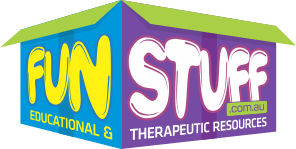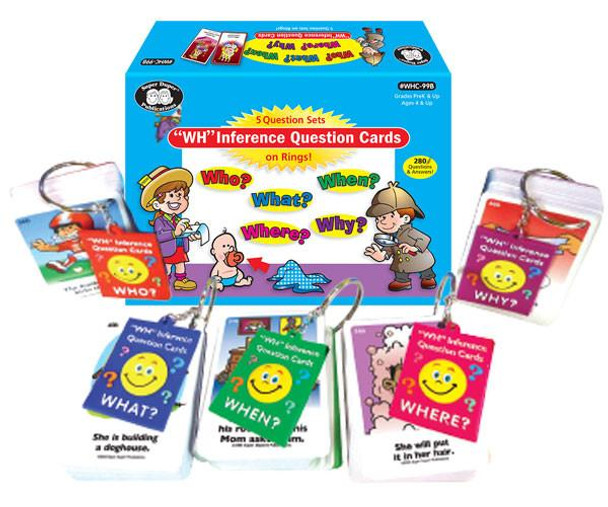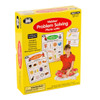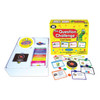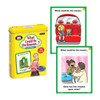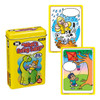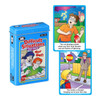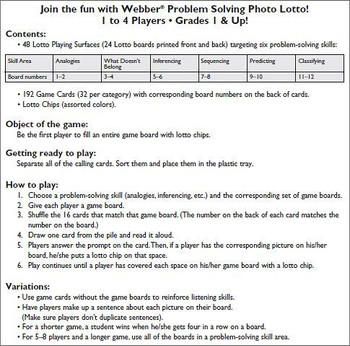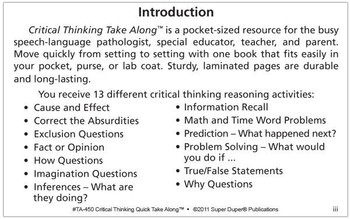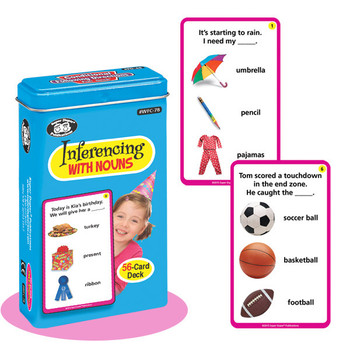Description
Inferencing, Problem Solving & Critical Thinking Pack
This pack of resources is full of fun items to assist in the understanding and use of Inference, Problem Solving and Critical Thinking skills.
Suitable for both primary and early secondary learning.
Webber Problem SolvingPhoto Lotto (BGO176) - Making good decisions is no problem with this lotto game.
Webber Problem Solving Photo Lotto improves reasoning, inferencing, sequencing, and semantic skills
—the essential components of logical thinking and the building blocks students need before they can advance to higher-level, abstract problem-solving.
Students match photos on their lotto boards with the answers to problem-solving questions on the 192 game cards.
Full-color photos make this lotto game appropriate for students with autism, learning disabilities, specific language impairments, attention deficits, and auditory-processing disorders.
Webber Problem Solving Photo Lotto targets six essential problem-solving skills: Analogies, What Doesn’t Belong, Inferencing, Sequencing, Predicting, and Classifying.
Inferencing Chipper Chat (CC48) - is an exciting magnetic chip game that targets 8 areas:
Associations, Emotions, Figurative Language, Jobs/Occupations, Part to Whole,
Prediction, Setting/Location, What Happened?
Includes 30 color-coded cards per topic. Each section contains 30 Receptive and Expressive prompts for a total of 240 cards.
The Receptive task requires the students to listen to a prompt and point to the picture that best illustrates the prompt.
The Expressive task requires students to generate their own answers to inferencing questions.
The Question Challenge Card Game (GB42) - is an expressive and receptive language card game that targets social skills and reasoning.
Students practice skills that are necessary for effective communication and problem solving.
The Question Challenge Card Game includes 30 cards for each of the following 10 skill areas:
Staying Calm through Self-Talk, Inferencing, Determining Perspective, Cognitive Flexibility,
Predicting, Intonation and Body Language, Questioning in Conversation, Social Encouragement,
Stating Opinions,Understanding Sarcasm
WH Inference Question Cards (WHC99) - Once students learn to ask and answer basic “WH” questions (Who, What, When, Where, and Why),
WH Inferencing Cards set helps them reach the next stage of “WH” development – inferencing. "WH" Inference Question Cards set gives children clues and hints to answer "WH" questions.
Each of the five card decks Who?, What?, When?, Where?, and Why? contains 56 double-sided cards for lots of practice.
Side A has a colorful picture and a "WH" question ("Why is Karla waving?"). This picture provides clues the children must use to infer the correct answer. Side B has a second, related picture and the answer ("She is going on a trip.").
What else is special about these cards? The decks are Ring Talkers! Each set is attached to a long-lasting metal ring for convenient use and storage.
Leave the cards on the rings as you teach or remove the cards as desired (and reattach them later).
Clues for Critical Thinking Super Fun Deck (FD236) - Target three critical thinking content areas (Inferencing, Predicting, and Vocabulary) with Clues for Critical Thinking Super Fun Deck.
Each of the three content areas has 40 cards (with photographs) containing nonfiction and fiction stories. The stories are ordered by readability (from 1st to 7th Grade) and word count (from 10 to 100 words).
Follow-up questions allow students to practice finding evidence within the story to support their answers. Questions become incrementally more difficult, starting with 3 answer choices, then 4 answer choices, and ending with open-ended questions.
Students can use the Secret Decoder to reveal clues in the text to help them come up with the correct answer, or they can state their answer, cite the evidence, then use the decoder to check their answer.
Difficult Situations Fun Deck (FD156) - helps students discuss how they would react to a variety of stressful situations.56 illustrated cards to talk about safety, emotions, and different
ways of acting in response to events that might occur. Improve reasoning, inferencing, sequencing, and memory skills too!
The Look, Listen & Infer Fun Deck (FD169) - helps students determine the "true" meanings of messages and can improve critical thinking, auditory comprehension, and inferencing.
Many times people do not communicate a complete message. They assume their listeners are also interpreting important visual information.
This 56-card illustrated Fun Deck teaches students to infer the meaning of a message by listening to a statement or question and also looking at the picture for important visual cues.
What's Being Said Fun Deck (FD39) - What would you say if you just lost a tooth? The What's Being Said? cards will help stimulate your students' expressive language and problem solving skills.
What's Being Said?
What Could Be the Reason? Fun Deck (FD174) - 56 colorfully illustrated picture cards to help students practice and build reasoning and inferencing skills.
